

How a Wonder Woman comic from 1942 led to the Great California Cow Exodus of 2012, maybe
Recently, Bill Frezza at Real Clear Markets published a story about cows fleeing California for other states because California’s state-minimum pricing of milk is too low to turn a profit.
The crisis in California stems from Golden State cheese makers carrying more political clout than dairy farmers. As a result, the minimum legal price of milk in California is 2 ½ cents per pound less than the average minimum legal price in other states. Two and a half cents may not sound like much, but in a business in chronic oversupply, that’s larger than typical profit margins.
With feedstock costs skyrocketing due to the diversion of corn to make subsidized ethanol-another brilliantly managed business- California dairy farmers are on the ropes. Meanwhile, California cheese makers enjoy a competitive advantage because it is illegal for out-of-state cheese makers to buy cheaper California milk.
Milk is apparently a very special product that requires the intervention of federal and state government to ensure that its market is properly managed. Supply-and-demand won’t work. Which is why the state of California has set a minimum price that consumers have to pay in order to get their milk at a price that is fair to cheese makers. And if the milk producers can’t sell enough of their product at that fair-to-cheese makers- price, then the government (i.e., “taxpayers,” i.e., “you and me”) buys the excess milk and turns it into cheese that we can’t eat. It’s the circle of life.
It turns out that this started a long time ago:
Around the time of the New Deal, guaranteeing the milk supply joined life, liberty, and the pursuit of happiness as one of the cardinal responsibilities of government. While this may be ascribed to a desire by politicians to always have enough babies to kiss, some suspect that buying the votes of dairy farmers had something to do with it.
Maybe it was vote-buying that originally motivated the program, but I have a feeling Wonder Woman might have had something to do with it. Back in July 1942 (“around the time of the New Deal”), Sensation Comics #7 ran a story in which Wonder Woman battled an evil milk magnate who was charging so much for milk that children were literally dying:
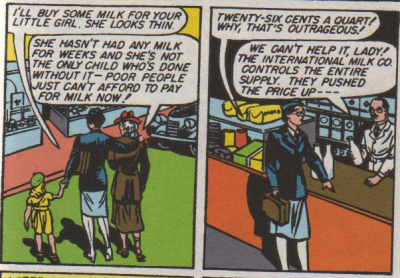
Wonder Woman, in her Diana Prince alter ego, goes to the offices of International Milk to investigate. There she meets the oily Mr. Alphonso De Gyppo, a man so transparently awful that he has a thin mustache and a racially insensitive name. As it turns out, his business plan is not entirely different from the current government milk subsidy program:
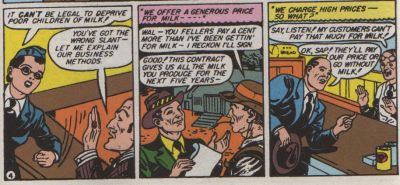
As Frezza points out, the minimum legal price of milk inflates the cost of milk so that everyone, even “poor children,” are forced to pay more. They just can’t tell exactly how much more:
Estimates put the cost to consumers as high as $5 billion a year. But since this tax is hidden, legislators get to enjoy the gratitude of dairy farmers without having to face the wrath of consumers, who remain in the dark about how much they are individually paying.
But because International Milk is a private business, and not part of the government of the people, by the people, and for the people, what they’re doing is wrong. Wonder Woman is not so subtle in her critique of Mr. De Gyppo’s business practices:
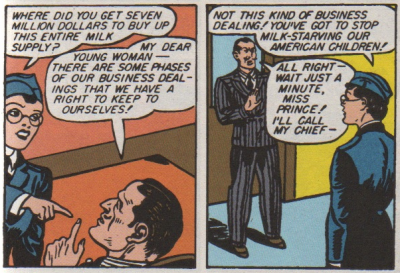
With the help of a trap door in the floor of his office, De Gyppo manages to capture Wonder Woman and, as so often happens in these wonderful old William Moulton Marston-Harry Peter stories, the heroine is tied up. The twist in this story is that after she’s tied up, she’s thrown into the back of a truck, which two semi-literate thugs slowly fill with milk:
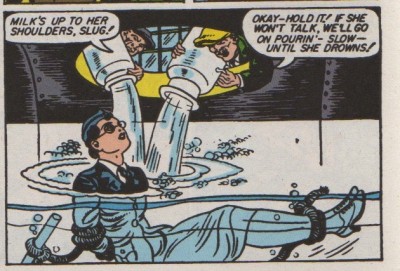
Wonder Woman escapes (she was just toying with them, anyway– for crying out loud, she’s Wonder Woman!), and leads a protest march against Big Milk “The Milk Racket”:

Just like Michelle Obama using her position as “First Lady” to pressure Walmart to sell less poisonous food, and to pressure Mars to stop selling disgustingly delicious “King Size” candy bars, Wonder Woman seeks to shame International Milk into adopting business practices that she deems appropriate. For her trouble, she is again captured, and again tied up, this time to the front of a tank truck filled with (what else?) milk. And here she finally discovers the truth about International Milk and its real leader and motives:
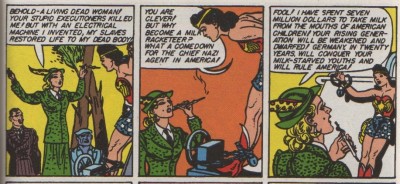
Yes, it’s all part of the evil Baroness Paula Von Gunther’s nefarious plan to weaken the bones of American children so they won’t be able to defend the country from future blitzkriegs. Something else that Michelle Obama has been warning us about, by the way: the obesity epidemic is a national security crisis.
As an aside: You’ll note in the panels above that The Baroness mentions that she has invented an apparently fictional “electrical machine” that raised her from the dead following her execution. This subplot allowed Marston to slip in a plug for an apparently real device he helped develop, the so-called “lie detector test.” While investigating Diana Prince’s disappearance, Major Steve Trevor gives a “lie detector” test to the doctor who officially declared The Baroness was dead:
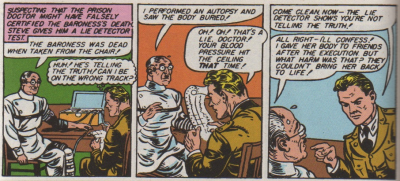
Anyway. Wonder Woman escapes from the milk tank, and uses her “magic lasso,” which is an apparently fictional device, to compel The Baroness to confess her plan. She also takes a moment for a photo op with a group of adorable young children who will no doubt benefit from the effects of cheap access to “milk, the perfect food,” assuming none of them are lactose intolerant:
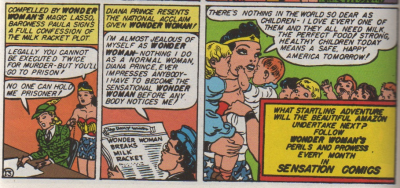
Although it’s not specifically spelled out anywhere in the story, it’s implied that The Baroness’s plan was then used to help draft the original legislation that has led to the current cow exodus that Frezza described in the Real Clear Markets editorial. Or, perhaps I should more accurately state that it’s inferred, by me, right now, today, that The Baroness’s plan was used to help draft that original milk-protecting legislation.
Like most superheroes of her era, the original Wonder Woman was a rah-rah FDR-loving New Dealer with the best of intentions. However, sometimes good intentions can lead to actions that have unintended consequences. In the world of comic books, this is called “the law of unintended consequences.” I’m not sure what they call it in social sciences, or in economics, or whatever discipline it is that studies these things. But perhaps if the people who write the dairy market laws would read Wonder Woman comics, the cows wouldn’t be leaving California, and milk wouldn’t cost quite so much.
The scans from this post were taken from the wonderful Wonder Woman Chronicles Volume 1, which is well worth your time.
Latest posts by Ricky Sprague (Posts)
- Meet the start-ups that are thriving in the current economic recovery - May 27, 2016
- How a Wonder Woman comic from 1942 led to the Great California Cow Exodus of 2012, maybe - November 28, 2012
- A common-sense approach to restoring economic prosperity - November 19, 2012
- New Philip K. Dick novel too absurd to be believed - September 17, 2012
- My 90 Days, 90 Reasons submission - September 12, 2012
 Print This Post
Print This Post

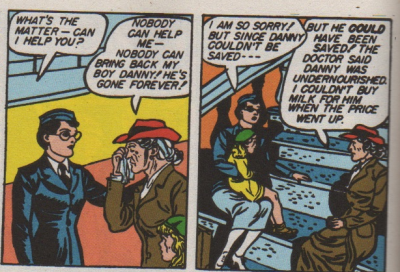
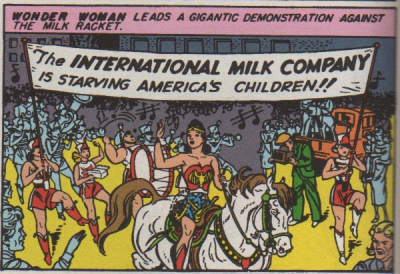



Discussion Area - Leave a Comment